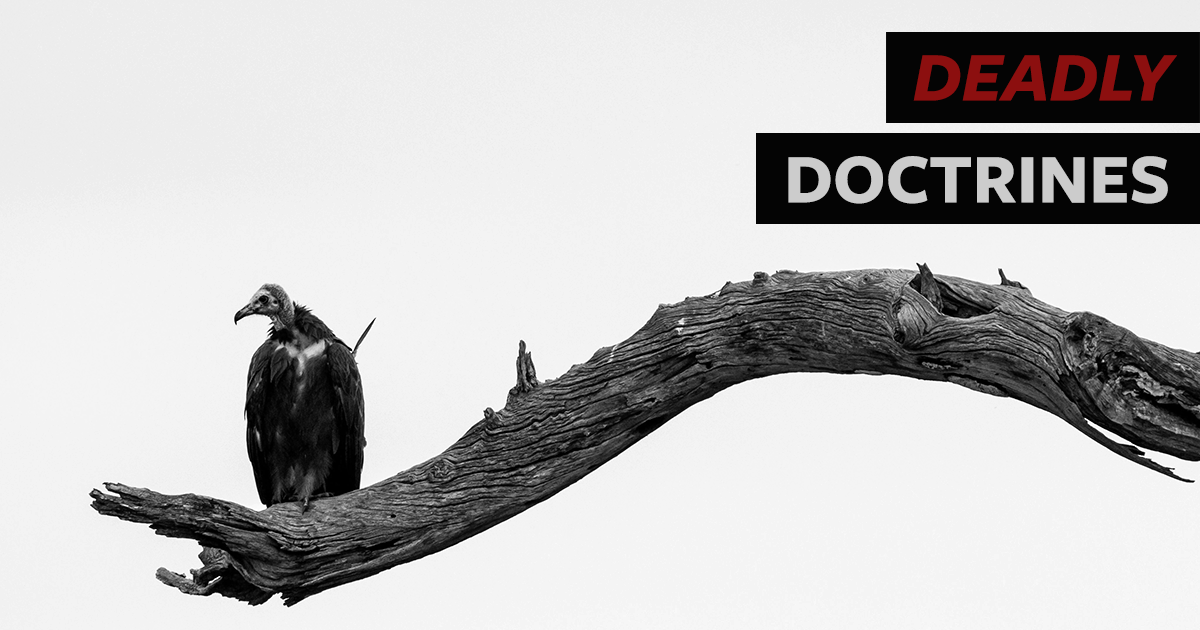Since its earliest days, the church has been plagued by false teachers and deadly doctrine. Never has there been a period of rest, a time when Christians could relax their guard. Satan has opposed the church since the day of its founding, and he will continue to oppose her until the day of his destruction.
Naturally, then, Paul was seriously concerned about false teachers and deadly doctrine, warning of them in almost every one of his letters. As he comes to the end of his letter to the Romans, he reminds the church to be on guard, since false teachers are skilled at using flattery and smooth words to deceive even believers. Paul loves this church and wants them to be aware of the challenges they will face from predatory teachers. But his solution may strike us as surprising. He tells these Christians “to be wise as to what is good and innocent as to what is evil” (Romans 16:19b).
Paul seems to be echoing Jesus here. In the book of Matthew, we read of Jesus sending out his disciples and warning them of impending persecution from enemies of the gospel. He tells them how to behave in the midst of such trials: “Behold, I am sending you out as sheep in the midst of wolves, so be wise as serpents and innocent as doves” (Matthew 10:16). Jesus and Paul both call for wisdom and innocence. Let’s see how these two passages instruct us on protecting ourselves and our churches from false teachers and their deadly doctrine.
Serpents and Doves
Jesus had taught and mentored his disciples, and he was now ready to send them on a short-term mission. They would go to their fellow Jews to tell them of the Messiah. They were like sheep being dispatched into a pack of dangerous wolves. Wolves are vicious, and sheep are helpless. Wolves are crafty, and sheep are dumb. How could these sheep survive? They would need to learn from two other creatures—snakes and doves.
Snakes are shrewd animals, able to make astute judgments. They are able to evaluate circumstances and behave in a fitting manner. When they see danger, they slither out of sight without hesitation. Doves, meanwhile, are innocent animals. Doves are simple, pure creatures who cause no trouble. Yet their simplicity is prone to lead them into danger, for they may not take flight when a predator draws near. Their purity is associated with their gullibility.
We are to be godly but not gullible—snake smart, but not snake sneaky.
Where Christians are prone to be as innocent as snakes and as shrewd as doves, God calls us to something far more noble and far more effective. Douglas Sean O’Donnell puts it this way: “We are to be godly but not gullible—snake smart, but not snake sneaky. For our character commends Christ; our godliness proclaims the gospel.” We are to behave in a way that draws attention to the gospel, not to ourselves. We are to ensure that any offense we give is the offense of the gospel, not the offense of our own depravity. We are to preach the gospel wisely, evaluating situations to discover the most appropriate way to speak the clearest truth. Wisdom and innocence best serve the cause of the gospel.
Wise and Innocent
Paul borrows the words of Jesus and applies them to a different context. If Jesus calls for a pure witness, Paul’s call leans toward a pure mind. Paul leaves us no simile to unpack and interpret. Knowing that false teachers and their deadly doctrine are close at hand, Christians are “to be wise as to what is good and innocent as to what is evil” (Romans 16:19b). J.B. Phillips paraphrases it this way: “I want to see you experts in good, and not even beginners in evil.”
Becoming an expert in truth by studying error is dangerous and wasteful, a backward, perilous approach.
Paul was aware of the temptation to grow so concerned about evil that we develop an obsession with it. We may assume that the best way to guard our faith is to become experts in false doctrine, to study the fine details of error so that truth may stand out. But there are at least two grave problems with this approach. First, we are too weak and evil is too strong for us to immerse ourselves in evil and remain untouched. Our acquaintance with evil can soon become an attraction to evil. Second, defending truth by studying error is a fool’s errand. God’s truth is profitable, but evil is a useless counterfeit, a perversion of the truth. God’s truth is fixed and unchanging, but evil is always morphing, always adapting to the trends of the age. Becoming an expert in truth by studying error is dangerous and wasteful, a backward, perilous approach.
Paul offers a far safer and far more effective solution. We must focus the best of our attention on what is good and pure and lovely (Philippians 4:8). We must make truth, rather than error, the focus of our studies and the delight of our hearts. We must trust that the foolproof way to identify false doctrine is to become experts in true doctrine. As John MacArthur says, “Don’t study false doctrine, don’t study sin, don’t study error. Stick with the truth and godly obedience.”
Our priority must always be the truth. We defend the Christian faith best when our grasp of sound doctrine is both deep and wide. The believer with great knowledge of truth is equipped to defend against every error.
The Posture of the Christian
When it comes to false teaching, the appropriate posture is acquaintance without obsession. We do well to know of the existence of error and its strategy for infiltrating the church. The shrewd Christian will be familiar with the primary challenges of his day, the most prominent errors, the foremost peddlers of heresy. Yet he will remain innocent by equipping himself with truth, rather than obsessing about error. As heresies arise, he will respond by increasing his familiarity with God’s Word, trusting that the light of God’s Word will expose the darkness of every error.
We must never allow the study of error to hinder our pursuit of the truth.
I will grant, of course, that there will be times when it is wise to gain greater familiarity with prominent and pernicious errors—the kind of errors that threaten to “deceive the hearts of the naive” (Romans 16:18). Some believers are especially equipped to study false doctrine so they can refute it with the Word of God. Many of us have benefited from the labor of such men and women. Yet, as Robert Mounce says so well, “God never intended his children to become intimate with evil in order to communicate the gospel to those in its grasp.” We must never allow the study of error to hinder our pursuit of the truth.










